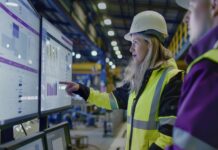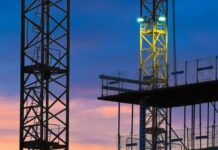The world has indeed been captivated due to the power of AI technologies such as ChatGPT, along with digital assistants like Siri, Alexa, etc. AI happens to have a transformative effect on the international industry. And there is indeed one industry that can immensely get benefited from AI adoption, which happens to be construction, as it is indeed one of the least digitized sectors in the world. AI within construction can go ahead and help businesses go for efficiency, elevate quality, enhance performance, and, at the same time, also straighten out safety on sites.
As per a McKinsey report, the construction sector happens to be worth over $10 trillion a year, which is equivalent to almost 13% of the GDP of the world. And only by digitization, market capitalization can get raised by another $1.6 trillion every year. It makes this sector one of the largest in the world economy.
Comprehending the role of AI in smart construction
AI as well as ML tech happen to be revolutionizing each and every stage of construction, right from design to operations as well as asset management. This technological upgrade is indeed bringing about major improvements when it comes to time and cost-effectiveness, especially in the planning as well as the design of sub-segments.
AI within construction management enables enhanced safety, speed, accuracy, as well as efficiency of operations. Because of AI construction solutions, companies can go on to proactively track the job sites for probable hazards and also address crucial issues so as to prevent accidents. ML within construction can go on to analyze the enormous amount of data so as to optimize designs for energy efficiency as well as cost savings. Robotics process automation- RPA can upgrade construction speed as well as quality.
In very simple terms, AI across the construction industry happens to be revolutionizing the way businesses execute, design as well as manage projects. And as the usage of AI continues to broaden, it becomes increasingly essential for companies to embrace this emerging tech.
The European market is most likely to lead AI adoption when it comes to construction, thereby driving growth in the international construction industry. By way of embracing digitization, all stakeholders, such as contractors, owners, as well as service providers, can go on to get benefitted out of this technological shift. As industry still happens to be in its early stages in terms of adopting AI, companies that go ahead and embrace as well as upgrade their technology are bound to gain a competitive benefit.
Let us discover use cases plus benefits of AI within construction, which will shift how businesses design as well as go on to develop projects.
AI use cases within the construction sector
AI happens to be a critical component when it comes to the modern engineering and construction industries. Artificial intelligence in construction goes on to help the sector solve its greatest issues, like cost, safety, as well as overruns. Notably, AI can obviously get used across construction project, right from inception and design to bidding, financing, transportation, as well as operation, and of course, asset management.
Let us now have a look in detail as to how businesses are making the most use of generative AI consulting across the construction industry:
Planning as well as designing
AI-based Building Information Modeling- BIM processes have been aiding architecture, engineering, as well as construction professionals go on to make 3D models efficiently to plan, design, build, and repair buildings as well as infrastructure.
With ML within the construction gamut, the industry makes use of AI-powered generative design so as to identify as well as collaborate with architects, mechanics, engineers, electricians, and also plumbers so as to make sure there happen to be no clashes in the sub-teams. The fact is that such measures go on to mitigate the risk of rework.
AI as well as machine learning within the construction sector discovers all the options as well as variations of the solutions so as to create design choices. Models with multiple variations are created and enhanced with every iteration. Notably, this iterative approach goes on to continue until the right model is achieved, thereby ensuring the creation of flawless designs.
Measuring the progress of the site
Construction companies can make use of AI-powered robots that are equipped with cameras in order to capture 3D pictures within the construction sites.
With the aid of neural networks, such pictures can get cross-checked with reference to the data coming from BIM as well as the bill of materials. The engineers that go on to manage large projects make use of this information so as to keep track of the growth. It also enables identifying quality errors at a very early stage while at the same time keeping tabs when it comes to financial information as well as time schedules.
It is not an exaggeration to say robotics as well as AI in the construction industry make sure of the delivery of the best construction projects while at the same time saving costs and time.
Strong Fleet Management
It is well to be noted that construction companies happen to be exploiting the traits of the Internet of Things- IoT in order to manage equipment and vehicles’ fleets. By making the utmost use of AI-driven metrics, IoT helps with real-time location tracking, battery tracking, as well as predictive maintenance. Due to the integration of IoT devices, companies can go on to efficiently forecast equipment breakdowns and, at the same time, also address issues, thereby resulting in major time and cost savings.
Mitigation of risk
Every construction site happens to be prone to some types of risks, like safety hazards, quality issues, delays, as well as cost overruns. The larger the project, the higher the chances of risk being involved, as there happen to be numerous sub-contractors working in tandem on job sites. By way of leveraging ML as well as AI construction solutions, general contractors can go ahead and monitor and, at the same time, mitigate risk instances within the job site, thereby allowing the project team to focus on their core functions.
AI algorithms go on to automatically prioritize challenges that are based on unsafe scaffolding, waterlogging, as well as personnel lacking basic but required protective equipment such as gloves, helmets, as well as safety glasses. It helps the contractors prioritize projects that are based on risk rankings and, at the same time, proactively address potential safety issues.
Alleviate the shortage of labor
There always happens to be a dearth of labor within the construction sector, as it involves risks and, at the same time, also happens to be a physically demanding job. The average turnover rate within the construction field happens to be way higher than in any other sector.
In such a scenario, AI-powered robots go on to empower project managers so as to oversee real-time situation as well as resource requirements across job sites. Based on the needs, labor can be shifted to a different part of the project or to a different job site. The robots track the site so as to find the pain areas.
For example, an AI-powered robot- Spot the Dog, goes on to conduct nightly scans across job sites so as to monitor progress. It enables contractors to raise productivity, especially within the remote areas with limited availability when it comes to skilled labor.
Predictive Analytics
AI algorithms can go on to analyze massive amounts of data collected by way of sensors, IoT devices, as well as historical project data, so as to provide predictive analytics. It helps construction companies to go ahead and anticipate potential issues and, at the same time, take proactive actions right before such a problem occurs that may go on to interrupt work. It, in all possibilities, goes on to enhance project planning, the safety of workers, and also decision-making.
As per the McKinsey report, executing predictive maintenance strategies can go ahead and lessen the machine’s downtime by 30-50% while simultaneously elevating its lifespan by 20-40%.
How Can the AI Boost Smart construction?
Companies that like to stay ahead in this competitive age should go on to quickly upscale their infrastructure as well as leverage AI technology so as to redefine their operational strategies. Let us now explore the multifarious advantages of AI in construction businesses.
Enhances the Productivity of Job Sites
Apparently, the construction companies make use of self-driving machinery so as to automate repetitive tasks, like pouring concrete, bricklaying, welding, and demolition. At the same time, they can also make use of autonomous or even semi-autonomous bulldozers so as to excavate as well as prep work. Once the right specifications happen to be fed into such machines, they go on to complete the job exactly as per requirements, freeing up the human workforce in terms of actual construction work.
It decreases time as well as the human risks which is involved in performing such tasks. Moreover, project managers can go on to leverage AI tech such as onsite cameras and facial recognition so as to assess worker productivity and, at the same time, track job site work and that too in real-time.
Upgrades the Project Design
AI can go ahead and significantly upgrade the project design. By way of evaluating some vast amounts of design data, AI algorithms can go on to identify patterns, make sure that layouts are optimized, and suggest design enhancements. It enables architects, engineers, as well as the designers to streamline the design process, enhance efficiency, and also create more innovative as well as optimized structures.
AI-powered design tools can go ahead and also simulate varied scenarios, assess structural integrity, and evaluate energy efficiency, thereby enabling informed decision-making as well as decreasing the risk of design flaws. Such integration in the AI into the design process goes on to lead to much more efficient, cost-effective, as well as sustainable construction projects.
Collects and also analyzes data
AI construction solutions like camera-enabled robots, autonomous equipment go ahead and also collect data across different formats. By way of inputting such details within a deep neural network, the system happen to automatically classify the project’s growth from many perspectives. This data helps the management identify as well as address even the minutest of errors or issues within the early stages, thereby mitigating the occurrence pertaining to major problems in the later stages.
Performs a land survey effectively
One can go on to dramatically curtail the time spent surveying land in detail and also taking aerial photos of the job site for enhanced project management. With the aid of drones, Geospatial Information Systems- GIS, and Geospatial AI- GeoAI, one can monitor project progress as well as problems on the construction site.
Automates project management
It is well to be noted that completing the construction manually can be really tedious and time-consuming, as well as susceptible to errors. The project manager often goes on to find themselves occupied in terms of assigning work as well as managing employee records.
AI within the construction gamut can efficiently automate such mundane tasks, thereby lessening errors and freeing up valuable resource time. AI automation can go on to delegate tasks based on employee data, making optimal use of the workflow and also helping the workers concentrate on specialized areas, elevating overall productivity.
The future when it comes to AI in construction
By making use of AI for construction, the sector is going to have cobots as well as robots working alongside the employees. Robots take over the tasks that happen to be automated, and cobots work autonomously or even with limited guidance. Such an arrangement will enable to speed up the construction process, save costs, decrease the injuries, enhance efficiency, and also help with better decision-making.
AI within the construction sector will also go on to lead to alterations in business models and, at the same time also lessen expensive errors, thereby making building operations more efficient. Thus, it is also advised that business leaders within the construction companies focus on investment in areas where AI can go on to have maximum impact based on the requirements.
Early adopters of such a digital transformation are indeed going to drive growth as well as gain a competitive edge, and getting such an edge will help business leaders set direction and hence reap the most benefits.




























